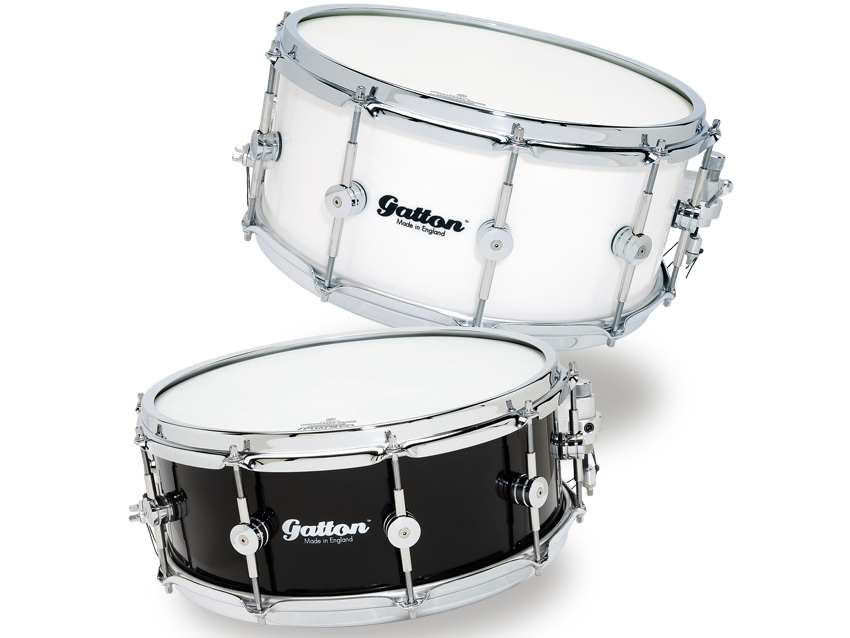MusicRadar Verdict
For the products of a young man just beginning his career as a drum maker, this pair of snares are incredibly accomplished. While they're made from an unfamiliar material, any reservations we had about Corian evaporated the moment we played them.
Pros
- +
Beautifully made, bold instruments with an original look. Unmistakably high-end sounds.
Cons
- -
We would have preferred two sets of lugs on the deeper drum (or tube lugs).
MusicRadar's got your back
Lincoln-based Gatton Drums is run by Craig Cockrell, a drummer of 15 years and craftsman within the family-owned company Cathedral Interiors for the past decade. Craig's first production drums - made from start to finish by him alone - feature neither wood nor metal shells; instead they are made from a synthetic material called Corian.
Build
Devised by DuPont in 1967, Corian consists of one part acrylic resin and two parts natural minerals. It's a versatile and environmentally-friendly material that is commonly used in interior and exterior design - the chances are there is something made out of Corian in your home.
The idea of creating Corian drums first occurred to Craig while attending a course on working with Corian. Here he learned that Corian's efficient acoustic reflection finds it often used to make the surrounds for loudspeakers.
"They are beautifully made instruments that make bold statements about the maker's capabilities and ambitions"
Our own research found a handful of companies in America manufacturing Corian snares. Whether or not any of them have reached the UK is difficult to gauge, and, taking into account exchange rates, Stateside examples would retail at around four figures in Sterling, way in excess of this home grown pair.
The fact that so few examples of Corian drums exist is perhaps not surprising as, despite its adaptability, creating the sort of precise cylinders that will make good drums is tricky and requires a high degree of skill. Craig works with sheets of Corian that are 6mm thick and heats them to 160°C. Once the temperature is reached, he has a small window of opportunity in which to bend the sheet into a circular jig before it starts to cool and set permanently.
An added complication is that, like most materials, Corian expands when hot, but Craig's method compensates for this, leaving perfectly round drums that are exactly 14" in diameter.
Want all the hottest music and gear news, reviews, deals, features and more, direct to your inbox? Sign up here.
After the initial cooling, Craig bonds the two ends with dedicated Corian adhesive. One of the magical properties of Corian is that, when worked correctly, it can be rendered seamless and this is the case with the pair of snare drums on review: there is no trace of a join to be seen. Running a finger round the inside of the shells we managed to detect a faint bump that could have been the join on the deeper drum but the shallower model was enigmatically smooth.
From here Craig sands and polishes the drums before adding the snare beds and cutting the bearing edges by hand. These are angled at 45 degrees with a slight round off on the outside and are, like virtually all other aspects of the drums, expertly finished.
The drums are dressed with quality components including Ego low mass lugs, S Hoops, TightScrew tension rods, Puresound snare wires and a Trick snare release and butt end. Only the unlined breathing holes stand out, as it's unusual to see a plain hole on any drum these days.
Hands on
The two drums sent for review - 14"x5 1/2" in Nocturne (black) and 14"x6 1/2" in Glacier (white) - display the full range of colour options currently available. Corian is manufactured in other colours and Craig hopes to broaden the choices in the future.
Corian is a dense material and so the drums feel a similar weight to equivalent brass-shelled snares. This hardness probably contributes to the drums' striking crispness. Every movement into the head is telegraphed straight to the snare wires, making the initial response fast and bright.
Beneath this, the note - particularly from the deeper drum - has a warmth and depth that you would associate more with a thick-shelled wooden snare. A dead centre hit results in the sort of fat 'clonk' that would nail a groove to the floor.
Moving away from the centre the note becomes embellished with a natural ring. At the very edges, where even a tickle of the sticks still rattles the wires, the sound is distinctly metallic. Rimshots harden the drums' sound without altering the pitch a great deal. This could be due to the influence of the S Hoops or the Corian shell itself (or both), but it makes for drums that are controllable yet still capable of shifts in dynamics.
